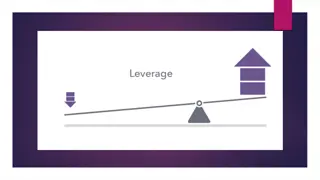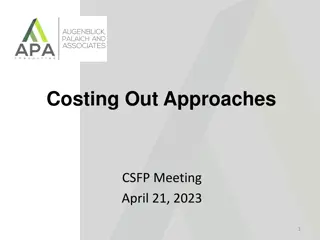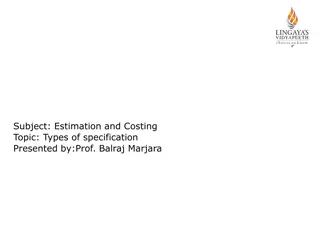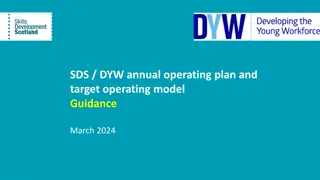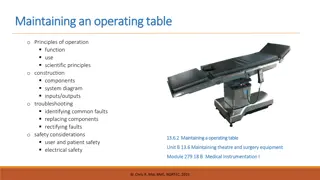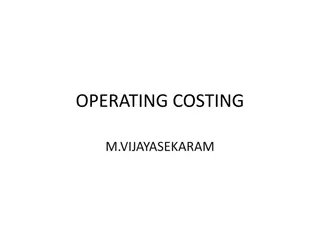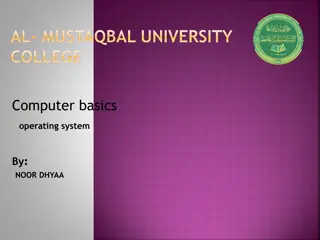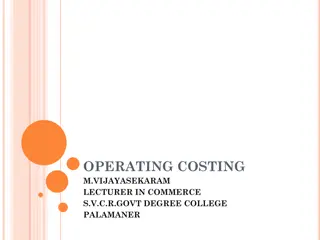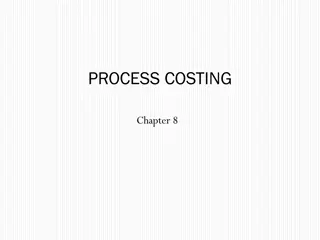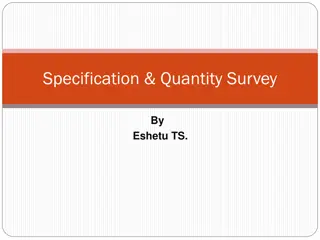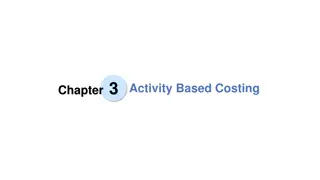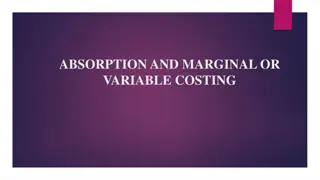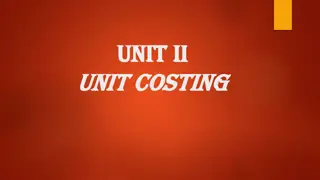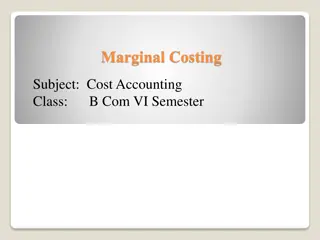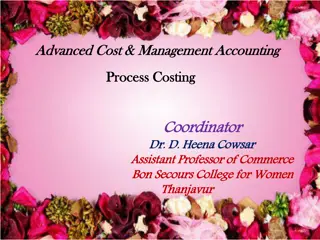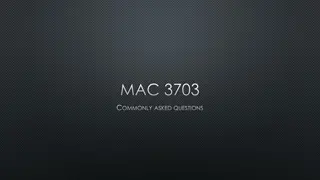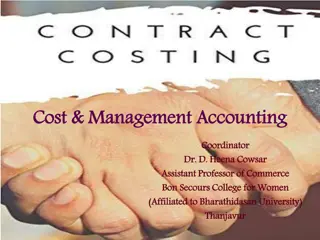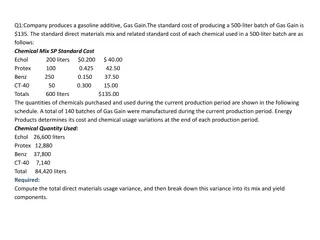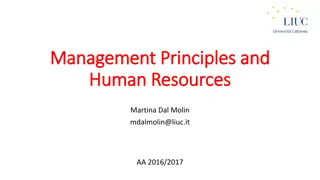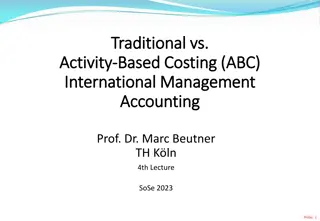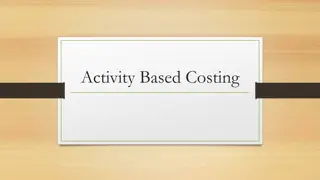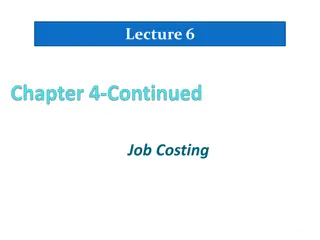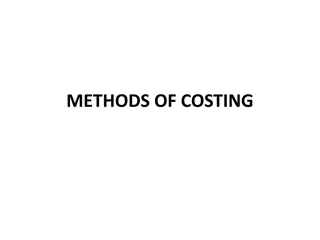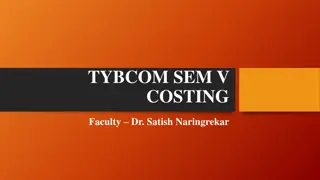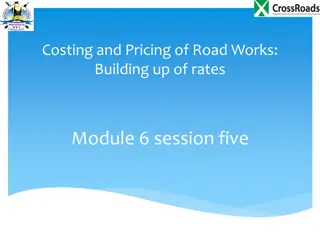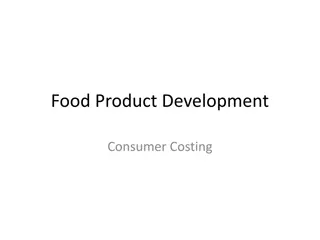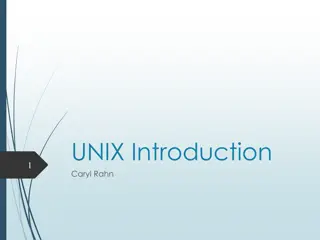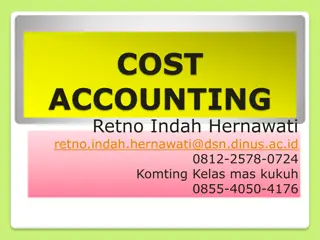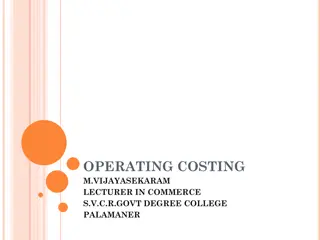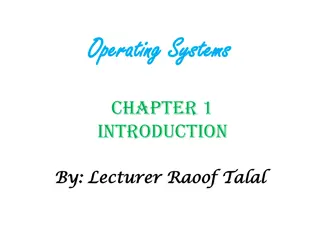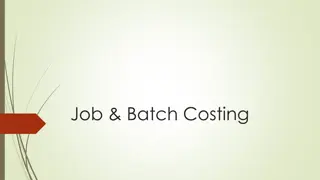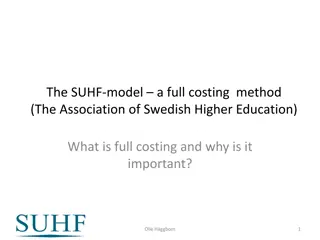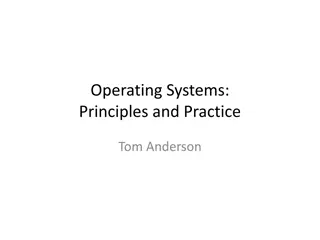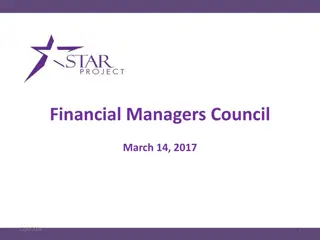Management Acounting & Control
Functions, scope, and limitations of management accounting, as well as cost accounting, break-even analysis, marginal costing, activity-based costing, budgeting, standard costing, responsibility centers, and current issues in management accounting.
21 views • 22 slides
Understanding Leverage and Operating Leverage in Financial Management
Leverage in financial management refers to using assets or funds with fixed costs to analyze the impact of debt and equity mix on shareholder returns and risk. Operating leverage focuses on leveraging fixed operating costs to amplify profit changes with sales variations, measured by the degree of op
2 views • 6 slides
Regional Education Agreement Costing Tools Presentation
Presented by Bram Lerat, Khrystyna Orobets, and Ronda Ziakris for the Assembly of First Nations, this presentation discusses tools available for First Nations education costing studies, including inclusive education and transportation cost models. The session covers key elements of cost studies and
1 views • 26 slides
Costing Out Approaches
Costing out approaches and studies have been developed to ensure schools and districts have adequate resources to meet state education standards. Implementing these approaches involves professional judgment, evidence-based benchmarks, and data requirements. Using multiple approaches allows for trian
0 views • 12 slides
Understanding Product Life Cycle Costing: A Comprehensive Analysis
Lifecycle costing involves tracking cost records of assets throughout their entire lives, optimizing asset usage at minimal cost. Product lifecycle costing accumulates a product's costs from inception to disposal, with stages like Introduction, Growth, Maturity, and Decline. It helps assess profitab
4 views • 19 slides
Operating Systems
An operating system is a crucial program that manages all other programs on a computer. It handles tasks like input recognition, file management, and device control. There are different types of operating systems such as single-user, single-task systems, multi-user, multi-task systems, real-time ope
6 views • 11 slides
Understanding Different Types of Specifications in Estimation and Costing
In the field of estimation and costing, four main methods of specifying are used: Descriptive, Performance, Reference Standard, and Proprietary. Descriptive specifications provide detailed descriptions without using proprietary names, allowing for tight control over specified work. Performance speci
1 views • 9 slides
SDS/DYW Annual Operating Plan and Target Operating Model Guidance - March 2024
This guidance outlines the development of an Annual Operating Plan and Target Operating Model (TOM) to enhance collaboration and improve outcomes for young people. It emphasizes aligning planning activities, co-designing learner experiences, and maximizing collective resources through strategic part
1 views • 9 slides
Maintaining an Operating Table: Principles and Functions
An operating table system comprises three components - the table column, table top, and transporter, each available in different versions for various surgical disciplines. Stationary tables are anchored to the floor, offering flexibility to adapt to patient needs. Mobile tables provide maneuverabili
0 views • 12 slides
Understanding Operating Costing in Service Industries
Operating costing is a method utilized by service-oriented businesses to ascertain the costs of providing services. Industries such as transportation services, welfare services, utility suppliers, and municipal services find operating costing beneficial. The method involves classifying costs into th
0 views • 6 slides
Understanding Operating Systems: Basics and Types
An operating system is essential software that manages a computer's hardware and software, allowing users to interact with the computer. Learn about the functions of an operating system, its importance, types available such as Microsoft Windows and macOS, and how they impact different devices. Disco
1 views • 11 slides
Understanding Operating Costing in Business
Operating costing involves ascertaining costs for providing standardized services, aiding in efficiency, cost control, pricing decisions, and equipment maintenance. The objectives, unit of cost, and cost classifications are crucial components of this costing method.
1 views • 5 slides
Understanding Process Costing in Manufacturing Industries
Process costing is a widely used method in mass production industries like steel and chemicals. It involves accumulating costs process-wise for standardized products resulting from sequential operations. Essential characteristics include continuous production, standardized products, and handling nor
1 views • 18 slides
Project Cost Estimation: Methods and Factors
Project cost estimation involves valuing all monetary aspects necessary for planning, implementing, and monitoring a project. This includes various entrants such as preliminary investigation costs, design fees, construction expenses, and more. The purpose of cost estimation is to determine work volu
1 views • 44 slides
Understanding Absorption Costing and Overhead Absorption in Cost Accounting
Absorption costing is a method that includes direct costs and a fair share of production overhead costs in the cost of a product. Overhead absorption rate (OAR) is calculated using budgeted figures and can lead to over/under-absorption. Over-absorption occurs when absorbed overhead is more than actu
1 views • 23 slides
Understanding Activity-Based Costing (ABC) in Cost Management
Activity-Based Costing (ABC) is a strategic costing method that allocates overhead costs to products based on activities. It offers benefits such as accurate cost allocation and identifying cost drivers but also has challenges due to increased complexity and customization. ABC differs from tradition
1 views • 15 slides
Understanding Absorption and Marginal Costing in Accounting
Absorption costing, also known as full costing, encompasses all costs including fixed and variable related to production. It aids in determining income by considering direct costs and fixed factory overheads. Meanwhile, marginal costing focuses on only variable manufacturing costs and treats fixed f
0 views • 14 slides
Understanding Unit Costing in Industries
Unit costing is a method based on production units and is used in industries with continuous and uniform production of a single product or similar grades. The cost per unit is calculated by dividing the total cost incurred by the number of units produced. Various industries like collieries, quarries
2 views • 18 slides
Understanding Marginal Costing in Cost Accounting
Marginal Costing is a cost analysis technique that helps management control costs and make informed decisions. It involves dividing total costs into fixed and variable components, with fixed costs remaining constant and variable costs changing per unit of output. In Marginal Costing, only variable c
1 views • 7 slides
Understanding Process Costing in Advanced Cost Management Accounting
Process costing is a crucial aspect of advanced cost management accounting, involving the allocation of costs in manufacturing. This process collects and processes costs incurred in different stages of production, distinguishing between normal and abnormal losses. It addresses wastage, cost allocati
0 views • 11 slides
Modern Developments and Approaches in Business Environment
This covers topics such as modern manufacturing, costing techniques, continuous quality management, optimizing throughput, externally-focused management approaches, forecasting techniques, pricing decisions, project management, and more. Specific discussions include differences between cost accounti
0 views • 11 slides
Understanding Contract Costing in Management Accounting
Contract costing in management accounting refers to a specific type of job costing applied to long-term projects like construction. Contracts serve as cost centers executed under customer specifications, involving materials, wages, direct charges, sub-contracts, and completion certificates. Contract
0 views • 14 slides
Costing and Variance Analysis in Manufacturing Processes
The content discusses various scenarios related to costing and variance analysis in manufacturing processes. It addresses topics such as direct materials usage variance, direct labor mix and yield variances, total direct labor efficiency variance, and standard costing system variances. The examples
0 views • 8 slides
Costing Techniques in Management Principles by Martina Dal Molin
Explore the different costing techniques such as Job Order Costing, Process Costing, and Operation Costing, as outlined by Martina Dal Molin for the Management Principles course. The Job Order Costing method focuses on allocating costs based on individual jobs or batches of products, emphasizing dir
3 views • 20 slides
Activity-Based Costing (ABC) in International Management: Methods and Analysis
Explore the application of Activity-Based Costing (ABC) in International Management, focusing on methods of assigning overheads, cost drivers, product and period costs, and value chain analysis. Dive into topics such as budgetary control systems, standard costing, flexible budgets, variance analysis
0 views • 48 slides
Understanding Activity-Based Costing for Cost Analysis
Activity-Based Costing (ABC) is a method used to allocate costs accurately by identifying activities that drive costs. It involves assigning costs to products based on the activities required to produce them. This approach provides a more precise reflection of the resources consumed by each product,
1 views • 8 slides
Understanding Job Order Cost Flow in Manufacturing
Job costing in manufacturing involves assigning manufacturing costs to work in process through debits to work in process inventory and credits to raw materials inventory, factory labor, and manufacturing overhead. Job cost sheets are used to record costs chargeable to specific jobs, acting as a subs
2 views • 44 slides
Introduction to Industrial Costing: Understanding Cost Types and Accounting Systems
Explore the fundamentals of industrial costing, including different cost types and accounting systems such as actual cost accounting, normal cost accounting, and standard cost accounting. Learn about cost data control, tasks of cost accounting, and the integration of cost type accounting in cost and
1 views • 24 slides
Introduction to Different Methods of Costing
Costing is a crucial technique for businesses to ascertain their costs, regardless of being in manufacturing, merchandizing, or service provision. This article explores various methods of costing such as job order costing, batch costing, contract costing, process costing, and service costing. Job or
0 views • 53 slides
Understanding Costing in TYBCOM Sem V with Dr. Satish Naringrekar
Explore the comprehensive study of costing including cost classification, composition of selling price, cost sheet format, prime cost, factory overheads, office and administrative overheads, cost of production, distribution overheads, and more in TYBCOM Sem V with the expert guidance of Faculty Dr.
0 views • 13 slides
Understanding Costing and Pricing of Road Works
Exploring the process of costing and pricing road works, including factors to consider, building up rates, and the importance of accurate cost estimation. Contractors cost road works to estimate resources, set competitive prices, and ensure profitability. Various approaches to costing works and key
0 views • 24 slides
Understanding Food Product Development and Costing
Explore the intricacies of cost management in food product development, including factors affecting costing, ways to reduce cost prices, and the impact on profit margins. Learn about key components of costing such as raw materials, testing, packaging, transportation, and marketing. Discover the diff
0 views • 12 slides
Understanding UNIX Operating System
UNIX is a versatile operating system that enables multi-user access, multitasking, and portability across various computing environments. It serves as the foundation for many modern operating systems and has influenced concepts incorporated in Microsoft Windows and DOS. The UNIX system comprises dis
0 views • 51 slides
Understanding Cost Accounting Principles and Concepts
Explore the fundamentals of cost accounting through the 14th edition by Carter. Learn about cost concepts, production costing, job order costing, process costing, activity-based accounting, joint costing, and standard costing. Dive into assessments, activities, and classifications of costs related t
0 views • 28 slides
Understanding Operating Costing in Service Industry
Operating costing, also known as service costing, is a method of determining costs for standardized services provided by organizations. It focuses on service provision rather than manufacturing goods. Key features include uniform service delivery, classification of costs into fixed and variable, and
0 views • 6 slides
Understanding Operating Systems: An Introduction and Overview
An operating system is a crucial program that manages computer hardware and serves as an intermediary between users and hardware. This chapter explores the role of operating systems in a computer system, covering components like hardware, application programs, and users. It delves into how operating
0 views • 16 slides
Understanding Job and Batch Costing in Industries
Job and Batch Costing are methods used in industries to ascertain the cost of specific jobs or batches separately. Job Costing is ideal for dissimilar or non-repetitive industries, while Batch Costing treats each batch as a cost unit. Both methods help in cost analysis, profitability assessment, and
0 views • 7 slides
Understanding Full Costing in Higher Education
Full costing in higher education involves accounting for both direct and indirect costs related to activities, projects, or cost units. It is important for efficient resource allocation, strategic decision-making, benchmarking, and transparency. By revealing the total costs involved, it provides val
0 views • 29 slides
Understanding Operating Systems: Principles and Practice in CSE Curriculum
Dive into the world of operating systems through the lens of "Operating Systems: Principles and Practice" by Tom Anderson. Discover how this course fits in the UW CSE curriculum, covering systems programming, operating system interfaces, and distributed systems. Explore the project work on building
0 views • 21 slides
Financial Managers Council Meeting Updates
The Financial Managers Council meeting on March 14, 2017, discussed updates regarding the AP User Group, invoice receipt date changes, decision council outcomes, STAR recommendations, AP batch process updates, project costing testing, and more. Recommendations were made to enhance the voucher stagin
0 views • 19 slides

